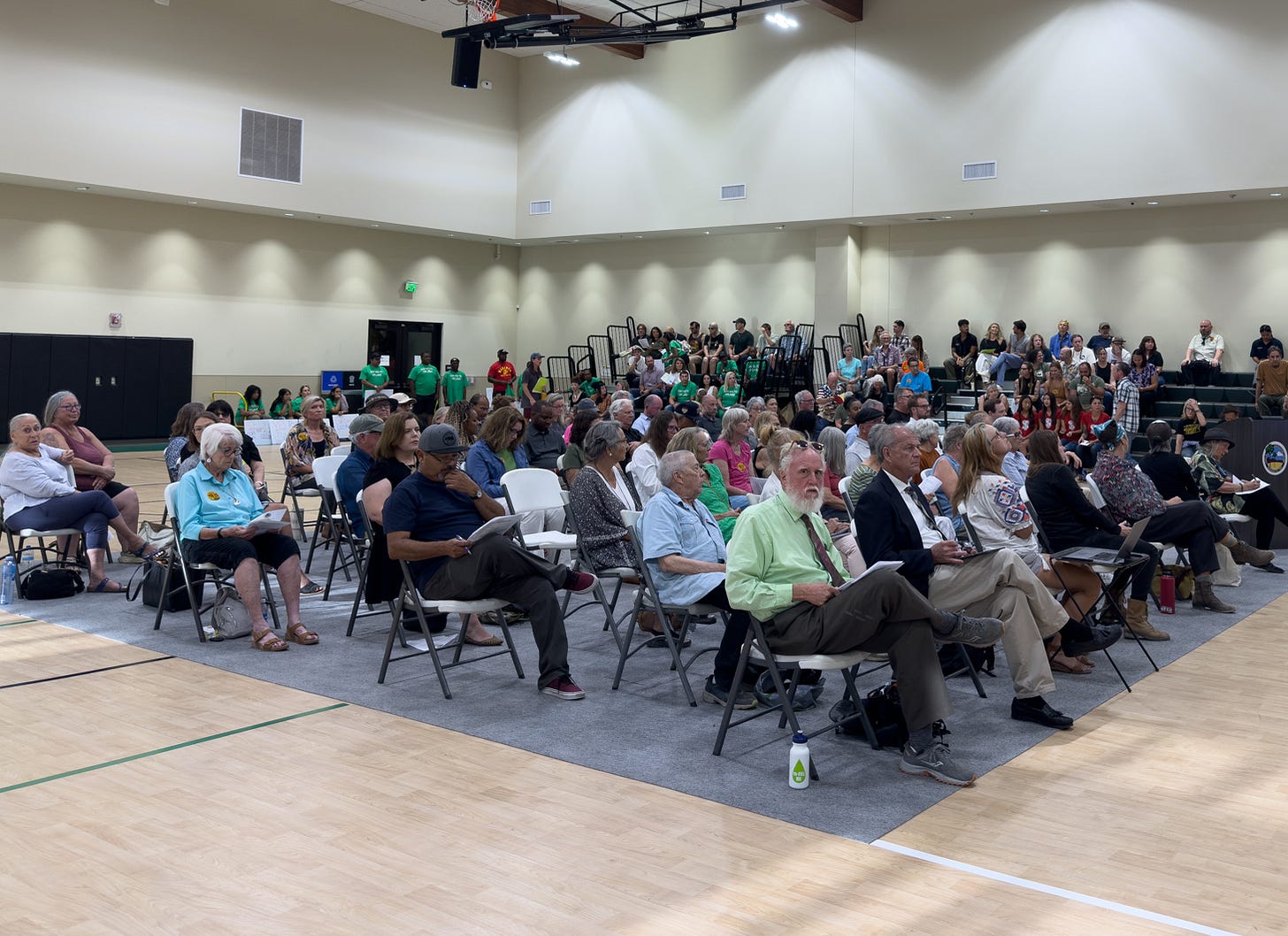
Don’t pave paradise to put up a parking lot — or in this case, a 100-unit resort. Allusions to Joni Mitchell’s 1970 hit “Big Yellow Taxi” were a common theme throughout the night. In a meeting that flew close to the three-hour mark, the Twentynine Palms City Council faced a packed gymnasium of residents who were there for one reason and one reason only — the Ofland Resort development project. All five council members were in attendance.
Our review of the agenda packet, which is more than 1,400 pages long, is linked here, and meeting footage is available for viewing here.1 Access to our previous Ofland coverage is available here.
After hearing a total of 42 public comments on the topic, and reading an unknown number of letters from those unable to attend in person, Council voted 5-0 to approve the Mitigated Negative Declaration (MND) and zoning and General Plan changes that would allow construction of the resort to move forward. This decision to approve the resort, which required conversion of a residentially zoned area to a tourist-commercial and open space conservation designation, was not conducted without controversy. There were approximately 18 statements in favor of the project and 24 who spoke against the project as proposed.
We’ll spare you the minutiae of the meeting formalities and get right to the main course.
Agenda Item 7. Public Hearing On Ofland Resort Project.
A divided-yet-excited crowd packed the gym, with opponents donning marigold stickers and supporters wearing green T-shirts.
Those in favor stressed the project’s emphasis on tourism, that it will bring local jobs and give work to local contractors. Those against the project argued for an in-depth Environmental Impact Report (EIR), citing desert tortoise and other wildlife concerns. They also noted that the project does not align with the California Environmental Quality Act (CEQA)— specifically, issues with the studies used to justify a Mitigated Negative Declaration. They pointed out that City violations of the noticing and comment period — CEQA requirements — will expose the City to potentially expensive litigation.
To move the project forward, Council needed to approve five components:
Approval of a Mitigated Negative Declaration (MND), which contains mitigation measures that must be met before development starts to curtail significant environmental, traffic, noise pollution, light pollution, and archaeological impacts.
Approve the City General Plan Amendment 24-000002, which creates a new zoning type for City land use—Open Space Conservation (OS-C)
Conduct the first reading of Rezoning 25-000001: This converts the 152-acre parcel from Single Family Residential - Estate (RS-E) to Commercial Tourist (CT) and the new OS-C zoning
Approve Development Code Amendment 25-000004 to formally create the Open Space Conservation zone, including development standards within the zone.
Approve Conditional Use Permit 24-000003, which grants Ofland permission for the project in accordance with CEQA.
Included with these elements were more than 100 conditions of approval for the project. One addresses biological resources and requires a Worker Environmental Awareness Program within one week of construction, another requires utility undergrounding for the project (these can be found starting on page 149 of the agenda packet.) 2
Project Overview: Housing, Design, Local Jobs, and Projected City Revenue
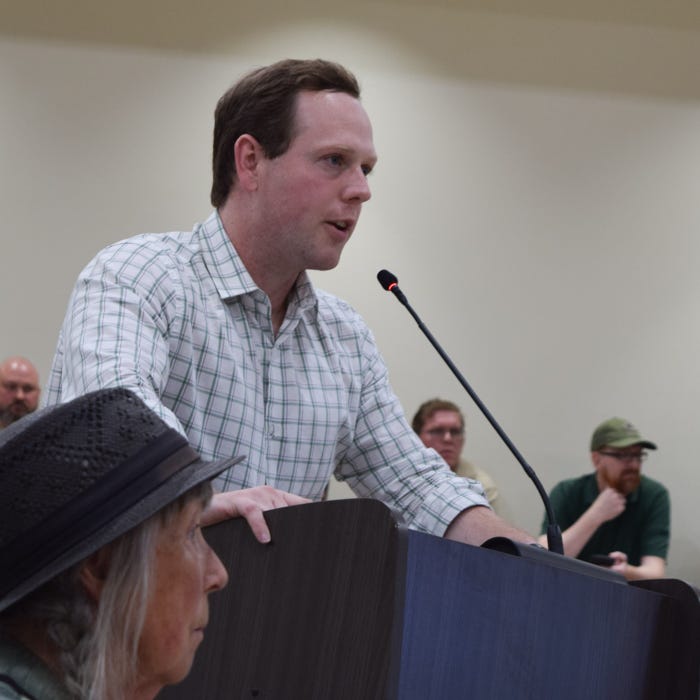
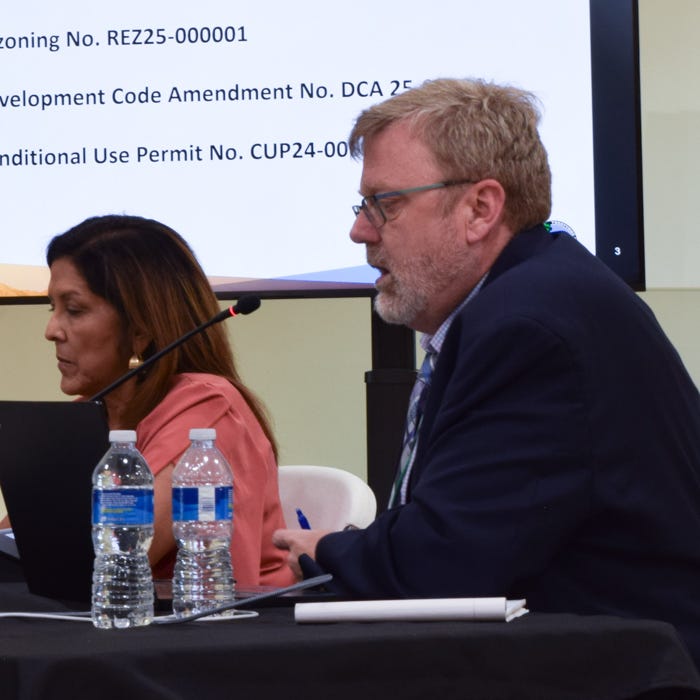
Ofland Director of Development Luke Searcy presented a site map and described project amenities. He emphasized the shared employee housing units, which Searcy said would be available to all employees. While this would not accommodate families, Searcy said a monthly housing stipend is available for employees who choose to live off the property:
If something goes wrong in the night, we'll have a manager that is seconds away from addressing that problem.
Part of City Staff’s argument for the Ofland project approval is that it will rake in approximately $492,750 in Transient Occupancy Tax (TOT), or hotel tax, annually, and $82,125 for the 1.5% Tourism Business Improvement District tax, but this is only if the resort maintains 50% occupancy with cabins selling at a rate of $300 per night. This figure, computed by City Staff and not by Ofland, is based on all 100 cabins being built. However, the project is planned in two phases with only 75 units being built in phase 1.3
As for the design of the 100 cabins, Ofland has adopted the desert-chic aesthetic of the area’s 2020-2023 Covid-19 gentrification period — a cross between a jackrabbit cabin and the midcentury modern style adapted by many recent STR builds in Joshua Tree. Searcy says the look is inspired by the cabins of the early 29 Palms homesteaders. Each cabin can house up to four guests and will include a queen bed, sleeper sofa, en suite bathroom, and porch.
Rezoning to Commercial-Tourist & the Open Space Conservation Designation
Open Space conservation zoning will make up approximately 110 of the parcel’s 152 acres, and it will surround 42 acres of developed land, making up a square with structures concentrated toward the center. Searcy says this designation means there will be at least 500 feet between Ofland’s structures and neighboring properties.
On the topic of rezoning, Searcy argued that if a housing subdivision were to be built on the lot instead, the development impact would be much greater:
Now I want to compare our project to what a 61-lot subdivision would look like from an impact perspective. A subdivision would have about three to four times the amount of square footage built. It would have about 40% more paving. It would have fencing, and it would have, of course, zero conserved square feet, where we have over 4.7 million.4
Public Comments: Faces from Councils Past
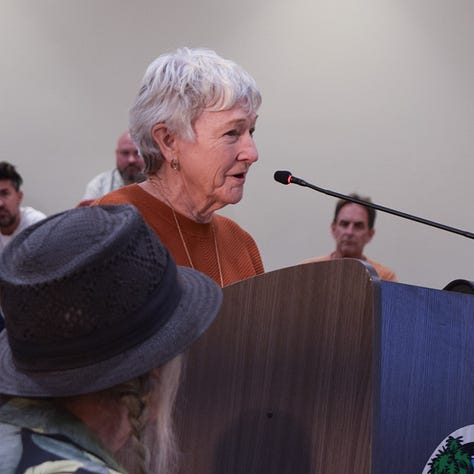
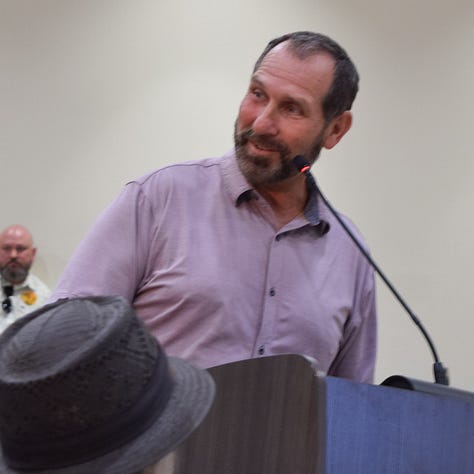
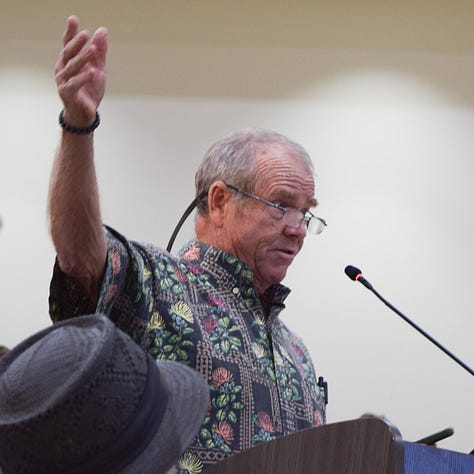
Among the familiar faces in the packed crowd was an alumna of past City Council administrations. Liz Meyer, the first woman elected to Council in 1992 and first woman mayor in 1994, spoke in favor of the Ofland concept. As one of many involved in the City’s arduous incorporation process back in 1987, Meyer warned that the additional time and expense required by a full EIR would kill this project.
I am one of many long term residents of Twentynine Palms, those that worked to achieve the cityhood in its first place, and those who always had an interest in the development of the city. We're not organized, but collectively we know this community. We have learned that as much as we would like to see balanced growth, it cannot happen without outside investors seeing our potential.
Larry Bowden, who served on City Council a number of years, as mayor in 1998, assistant City Manager, and most recently as interim City Manager, was pro-Ofland.
Years ago as the City Council, we realized tourism was our future. We had 1 million visitors in the National Park then. Now they told me it's 3 million to 3.5 million.5 So smart move on our part. Ofland is making a big investment in Twentynine Palms to go through that and [not] put out a crappy product.
I know that people don’t want this next to their homes. I get that. But you know, Twentynine Palms is Twentynine Palms. It’s not just Indian Cove. It’s not just Hansen Tract, Sunmore Estates… it’s Twentynine Palms.
With regard to statements swirling on social media of a Council or Planning Commission recall in response to the Ofland decision, Bowden implied the City should not be intimidated, ending his statement with a rebuke: “Do your jobs.”
Residents Opposed
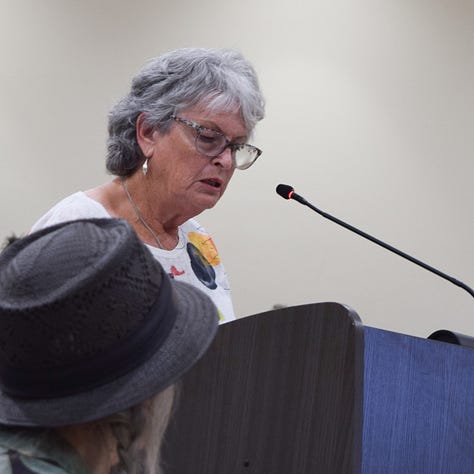
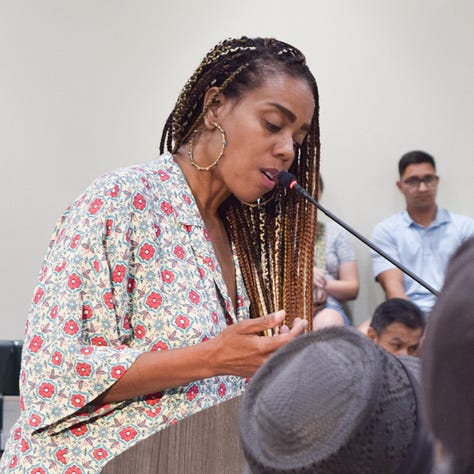
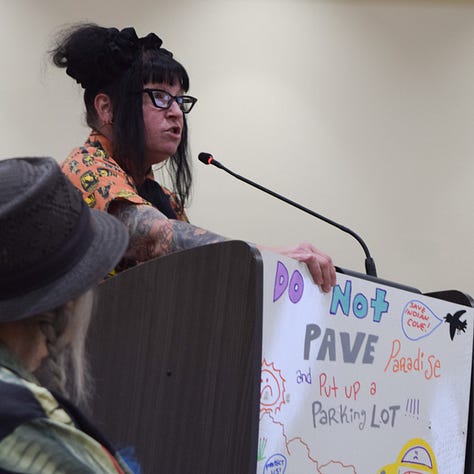
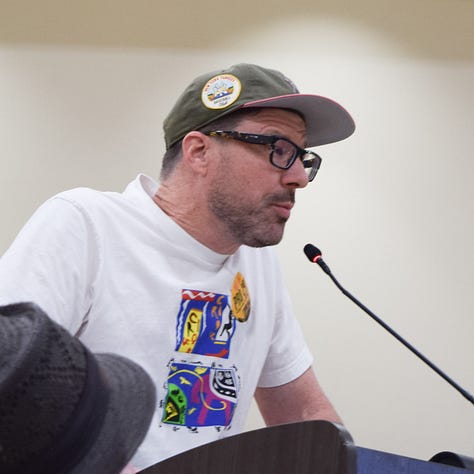
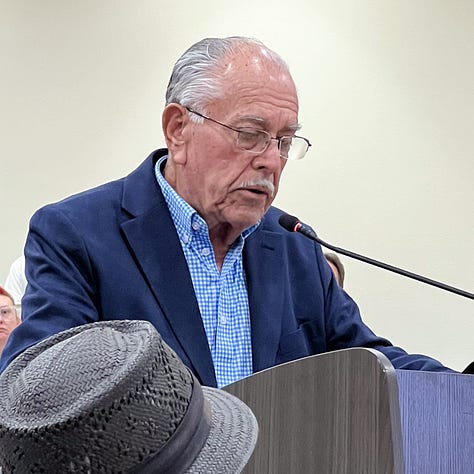
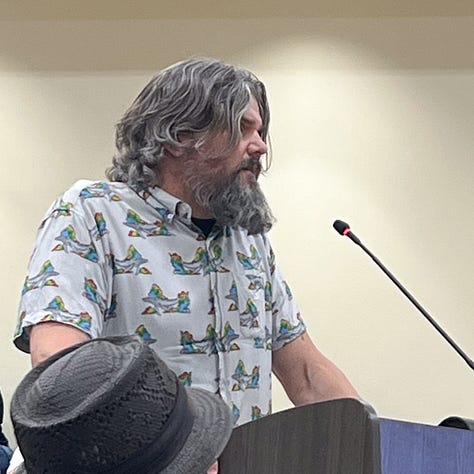
Resident Mary Jane Binge called for a full EIR and, alluding to the project’s proximity to the unincorporated town of Joshua Tree, warned City officials about “sacrificing the project to the west.”
Indian Cove resident and member of the Say No to Ofland group Tonya Jones said projected TOT revenue is not based on independent analysis. Jones argued that approving this resort violated the principles of the City’s General Plan and land use elements. Highlighting the approval process and community feedback of the recently opened Reset Hotel to reinforce the argument — that the SNTO group is not anti-development or full of NIMBYs — Jones said:
What I ask is, what will it cost the rest of us in infrastructure strain, city resources, lost trust, and even potential legal fees and taxpayer dollars to CEQA challenges?
Reset Hotel developer Adam Wininger said residents would be more in favor of the project if it were proposed on commercial property like the Reset Hotel.
MJ Fiocco, former Senior Transportation Specialist for the U.S. Department of Transportation, urged that the project be sent back to the Planning Commission for further review, be scaled down from 100 to 61 units, and that the City implement a formal resort development policy moving forward.
Jim Lawless questioned if any Council members lived in Indian Cove. Beth Anderson dubbed the projected TOT numbers as fluff — saying she had spoken with the City of Escalante, Utah's treasurer, where Ofland’s only operating property is located — “the money equals pretty much a big fat zero.”
Chrix Zzyzx called for Council to take a brief pause, stop, and think about the project’s permanent impact:
A lot of people have talked about it tonight, and I think we should just really take it into account that this will bring impending lawsuits. There are people who've already said that they're going to come forward and do it, so let's just take a moment. We're all human beings everywhere in this room. We're all benefiting from being able to talk about it. We depend upon the land around us, and yes, the revenue is good for the city, but let's put it somewhere else. Let's put it somewhere where it doesn't have such a big impact on the very environment that we live in.
“Say Yes to Ofland”
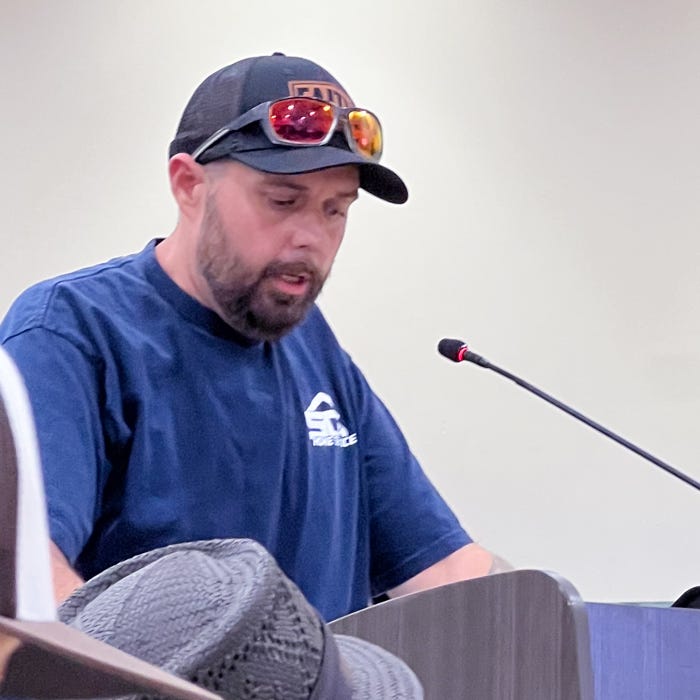
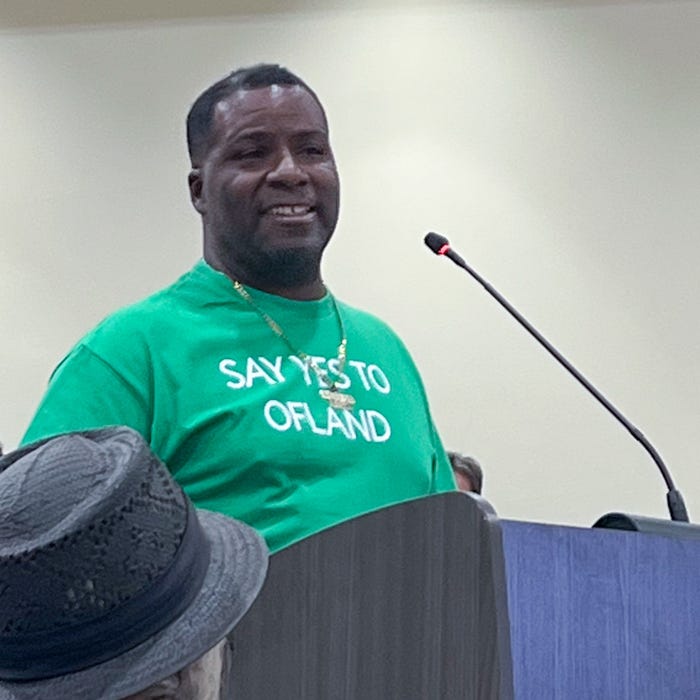
James Baskin, small business owner, reeled in Council:
We need to think real hard, and — sorry that we give you so much pressure — but we put this up to you. And everybody in here had opportunity to be on council, but they didn't get voted in. You got voted in — we support what you support and our children all around us, need this. We’re looking for a change in our community, a future.
Sandra Claus, real estate broker and owner of America’s Choice Real Estate, who, like Baskin and several others, wore a green “Say Yes to Ofland” shirt, argued that approving the project would be a proactive way of positioning Twentynine Palms for long-term success:
[Ofland] will create much needed jobs for our residents, from construction to hospitality, retail and maintenance. At a time when many communities are bracing for economic downturns, this project offers stability, opportunity, and a path forward.
A number of contractors and construction workers were in the room, eager for more local projects like the Reset Hotel, which was known to hire locally during construction. Thomas O’Connor advocated for a local preference policy for labor contracts:
A local preference policy would ensure fair bidding, create jobs and deliver quality projects from people who care about our home. Let's keep our economy strong by investing in our home.
Pulling at the heart strings from many pro-Ofland commenters was a plea for youth and the need for local, sustainable jobs for future generations. DJ Godoy, an active-duty Marine and member of the local Potter’s House Church Council, moved to the town in 2020:
My wife and I — we recently made the decision — we want to raise our family here in 29 Palms. So we want to see that growth. Because I want my kids to have opportunities here, and I want my family to plant their roots here… So please take into consideration just the opportunity and the future potential that this town has. Thank you.
“What happens if we are sued?” — Councilmember Comments on Ofland & A Motion to Vote
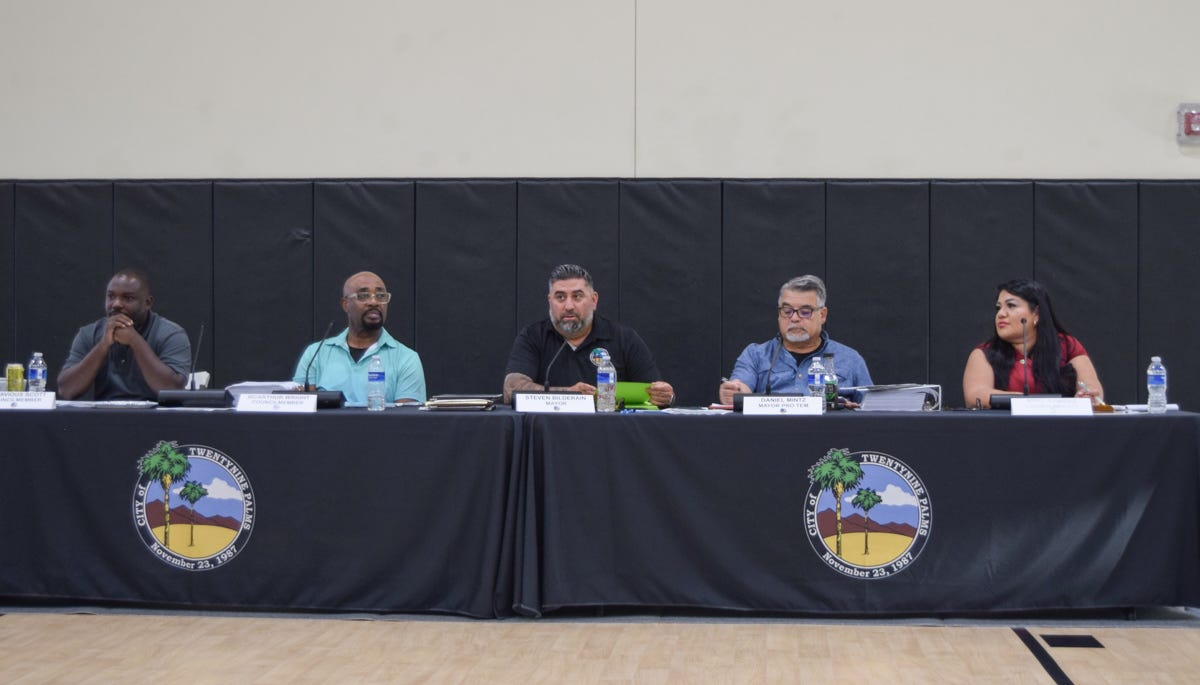
Looming on the minds of City officials, and mentioned by many in public comment, is the project’s potential to open the town to litigation. Mayor Pro Tem Daniel Mintz asked: “What happens if we are sued?”
Assistant City Attorney Jennifer Farrell was present to answer legal questions from Council:
There is a potential risk of litigation as we heard tonight from several of our speakers. If there was an approval of the project and a lawsuit was filed, the City would be named as party as would the developer. We have a condition of approval, and the entitlements tonight, that would require the developer to indemnify the City. That would mean the developer would be paying the [city] legal fees and be responsible for any cost incurred.
Councilmember Octavious Scott expressed favor for the employee housing aspect of the project but was concerned that the developer and the City were both using Terra Nova as CEQA consultant for the project. Indian Cove resident Chuck Heard also expressed this concern in public comment. Current City policy allows this and does not cite it as a conflict of interest or ethics violation.
Scott asked what would happen if Ofland chose to sell the property:
Mr. Gardner, if the developer chooses [to purchase] this property and maybe they sell the property, will this zoning change still be in effect?
Gardner confirmed that the commercial-tourist and open-space conservation zoning would remain if Ofland sold the property or off-sells the project. Gardner emphasized that while the City cannot stop Ofland from selling the lot or the project to another developer, that Council was approving the project itself and not the developer.
Summing up discussion with a motion for approval was Mintz, the longest-serving member on the current dais and former three-time mayor:
I just feel like just seeing what the folks on Ofland have done on this, listening to some concerns, I see we're not going to please everybody up here. Sometimes I feel like this job is like a referee. Only 50% of the people are ever going to like what we do. So that's kind of where I’m at, and I do support this project.
The motion to approve the Ofland development project was seconded by Council member McArthur Wright and, despite concerns cited in public comments and with little discussion of project details, approved unanimously with a 5-0 vote.
Followed by brief open public comment from Susan Peplow and Caitlin Gill, Councilmember Scott proposed a future council initiated agenda item that the City explore its CEQA consultant policy, which was seconded by Wright. In a City Manager’s report, Stone James said he will be introducing another affordable housing program to the City in the near future.
The next City Council meeting will take place August 26, 2025, at City Hall.
NOTE: Desert Trumpet staff members Cindy Bernard, Kat Talley-Jones, and Heidi Heard live in the Indian Cove neighborhood, adjacent to this proposed development project, and are on the organizing committees of Indian Cove Neighbors and Say No to Ofland.
Leave your thoughts in the comments below. Please note that we do not allow anonymous comments. Please be sure your first and last name is on your profile prior to commenting. Anonymous comments will be deleted.
Feel free to share this article!
Help us reach our 2025 goal of $10,000 in subscriptions! Upgrade to a paid subscription for just $5 per month or $50 per year.
Would you care to donate more than $100? Our Paypal account is up and running!
The Desert Trumpet is published by Morongo Basin Projects, a 501c3 charitable organization. Note that donations in excess of $100 are tax deductible to the extent allowed by law, and your subscription/donation will be listed as Morongo Basin Projects on your statement.
City IT Manager Eli Marshall noted in a July 23, 2025 City Facebook post that the first five minutes of audio of the meeting are unavailable due to technical issues.
Desert Trumpet has not verified the figures cited by Searcy.


I must add another comment to my initial one…if anything, the Planning Commission should have recommended the removal of an outdoor movie screen. If they are truly wanting to promote the town, they should realize that Smiths Ranch has one of the few remaining drive-in movie theaters in California and these Ofland tourists should be encouraged to go there to support this homesteading family business, instead of a contrived experience at the resort. I have been to Escalante recently where the Yonder resort is just a ways west of town. It’s a charming town, but with few cafes or even a coffee house. I saw very few people roaming around town when we were there.
!IMPORTANT! Councilmembers for Districts 3, 4, and 5 have terms expiring in 2026. They can and should be voted out if we can find candidates who actually care enough to understand the distinction between developer greed, extraction, and sustainable economic growth. We have so many commercially-zoned buildings and properties that are dilapidated and need revitalization. We don't need vultures forcing their business plans on us and ruining our ecosystems and neighborhoods and lying about the fact that they will actually create sustainable jobs for locals. In the meantime, I hope there will be many lawsuits and whatever it takes to slow or stop this disaster.
On another note... I wonder if that church got any special new donations recently....